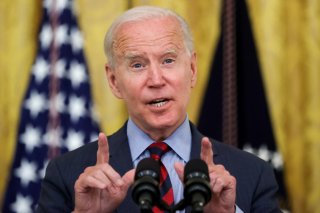Joe Biden's Massive Victory: What Is Actually in the Infrastructure Bill?
Per the White House fact sheet, the bill includes $110 billion for roads, bridges, and other projects, which it calls “the largest dedicated bridge investment since the interstate highway system” in the 1950s.
On Monday, President Joe Biden is expected to sign one of the more significant pieces of legislation of his presidency, the infrastructure bill that was passed by bipartisan majorities in both houses of Congress.
The bill is also known as the Bipartisan Infrastructure Framework, or BIF, although the official name is the Infrastructure Investment and Jobs Act. The bill passed the Senate in August by a vote of 69-30 and passed the House in November by a closer margin of 228-206.
As Biden has been fond of pointing out in recent public comments, his predecessor Donald Trump never signed an infrastructure bill into law during his presidency, although he did on multiple occasions declare “Infrastructure Week,” before getting distracted by other matters.
The infrastructure package grew out of what Biden originally called the American Jobs Act, which was dedicated more towards traditional infrastructure, although the bill that passed has been through many changes, through negotiations with Congress. Biden’s other major legislative piece was first known as the American Families Plan, and the administration is hoping to pass a version of that plan that’s now known as the Build Back Better framework.
The bipartisan bill, per the White House website, “will rebuild America’s roads, bridges, and rails, expand access to clean drinking water, ensure every American has access to high-speed internet, tackle the climate crisis, advance environmental justice, and invest in communities that have too often been left behind. The legislation will help ease inflationary pressures and strengthen supply chains by making long-overdue improvements for our nation’s ports, airports, rail, and roads.”
Per the White House fact sheet, the bill includes $110 billion for roads, bridges, and other projects, which it calls “the largest dedicated bridge investment since the interstate highway system” in the 1950s. The new law will also dedicate billions to public transportation, while promising the creation of more than 700,000 new jobs each year, including 175,000 each in manufacturing and construction and an additional 100,000 in transportation.
In addition, the bill will replace lead pipes and provide additional broadband infrastructure to areas where it is currently unavailable. It also promises action for dealing with the climate crisis, including a network of electric vehicle charging stations.
“In the United States, 1 in 5 miles of highways and major roads, and 45,000 bridges, are in poor condition,” a White House fact sheet explains. “The legislation will reauthorize surface transportation programs for five years and invest $110 billion in additional funding to repair our roads and bridges and support major, transformational projects. The Bipartisan Infrastructure Deal makes the single largest investment in repairing and reconstructing our nation’s bridges since the construction of the interstate highway system.”
Stephen Silver, a technology writer for The National Interest, is a journalist, essayist and film critic, who is also a contributor to The Philadelphia Inquirer, Philly Voice, Philadelphia Weekly, the Jewish Telegraphic Agency, Living Life Fearless, Backstage magazine, Broad Street Review and Splice Today. The co-founder of the Philadelphia Film Critics Circle, Stephen lives in suburban Philadelphia with his wife and two sons. Follow him on Twitter at @StephenSilver.
Image: Reuters

